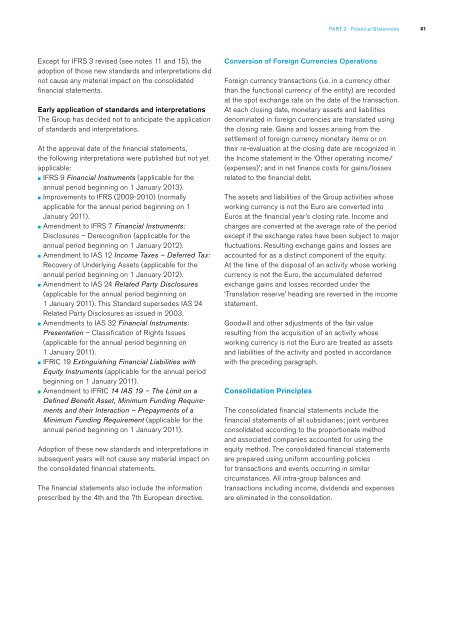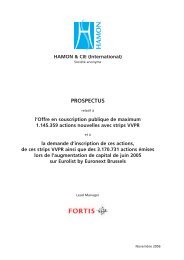Download PDF version English(2664KB) - Hamon
Download PDF version English(2664KB) - Hamon
Download PDF version English(2664KB) - Hamon
Create successful ePaper yourself
Turn your PDF publications into a flip-book with our unique Google optimized e-Paper software.
Part 3 - Financial Statements<br />
61<br />
Except for IFRS 3 revised (see notes 11 and 15), the<br />
adoption of those new standards and interpretations did<br />
not cause any material impact on the consolidated<br />
financial statements.<br />
Early application of standards and interpretations<br />
The Group has decided not to anticipate the application<br />
of standards and interpretations.<br />
At the approval date of the financial statements,<br />
the following interpretations were published but not yet<br />
applicable:<br />
■ IFRS 9 Financial Instruments (applicable for the<br />
annual period beginning on 1 January 2013).<br />
■ Improvements to IFRS (2009-2010) (normally<br />
applicable for the annual period beginning on 1<br />
January 2011).<br />
■ Amendment to IFRS 7 Financial Instruments:<br />
Disclosures – Derecognition (applicable for the<br />
annual period beginning on 1 January 2012).<br />
■ Amendment to IAS 12 Income Taxes – Deferred Tax:<br />
Recovery of Underlying Assets (applicable for the<br />
annual period beginning on 1 January 2012).<br />
■ Amendment to IAS 24 Related Party Disclosures<br />
(applicable for the annual period beginning on<br />
1 January 2011). This Standard supersedes IAS 24<br />
Related Party Disclosures as issued in 2003.<br />
■ Amendments to IAS 32 Financial Instruments:<br />
Presentation – Classification of Rights Issues<br />
(applicable for the annual period beginning on<br />
1 January 2011).<br />
■ IFRIC 19 Extinguishing Financial Liabilities with<br />
Equity Instruments (applicable for the annual period<br />
beginning on 1 January 2011).<br />
■ Amendment to IFRIC 14 IAS 19 – The Limit on a<br />
Defined Benefit Asset, Minimum Funding Requirements<br />
and their Interaction – Prepayments of a<br />
Minimum Funding Requirement (applicable for the<br />
annual period beginning on 1 January 2011).<br />
Adoption of these new standards and interpretations in<br />
subsequent years will not cause any material impact on<br />
the consolidated financial statements.<br />
The financial statements also include the information<br />
prescribed by the 4th and the 7th European directive.<br />
Con<strong>version</strong> of Foreign Currencies Operations<br />
Foreign currency transactions (i.e. in a currency other<br />
than the functional currency of the entity) are recorded<br />
at the spot exchange rate on the date of the transaction.<br />
At each closing date, monetary assets and liabilities<br />
denominated in foreign currencies are translated using<br />
the closing rate. Gains and losses arising from the<br />
settlement of foreign currency monetary items or on<br />
their re-evaluation at the closing date are recognized in<br />
the Income statement in the ‘Other operating income/<br />
(expenses)’; and in net finance costs for gains/losses<br />
related to the financial debt.<br />
The assets and liabilities of the Group activities whose<br />
working currency is not the Euro are converted into<br />
Euros at the financial year’s closing rate. Income and<br />
charges are converted at the average rate of the period<br />
except if the exchange rates have been subject to major<br />
fluctuations. Resulting exchange gains and losses are<br />
accounted for as a distinct component of the equity.<br />
At the time of the disposal of an activity whose working<br />
currency is not the Euro, the accumulated deferred<br />
exchange gains and losses recorded under the<br />
‘Translation reserve’ heading are reversed in the income<br />
statement.<br />
Goodwill and other adjustments of the fair value<br />
resulting from the acquisition of an activity whose<br />
working currency is not the Euro are treated as assets<br />
and liabilities of the activity and posted in accordance<br />
with the preceding paragraph.<br />
Consolidation Principles<br />
The consolidated financial statements include the<br />
financial statements of all subsidiaries; joint ventures<br />
consolidated according to the proportionate method<br />
and associated companies accounted for using the<br />
equity method. The consolidated financial statements<br />
are prepared using uniform accounting policies<br />
for transactions and events occurring in similar<br />
circumstances. All intra-group balances and<br />
transactions including income, dividends and expenses<br />
are eliminated in the consolidation.














